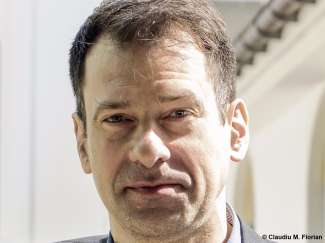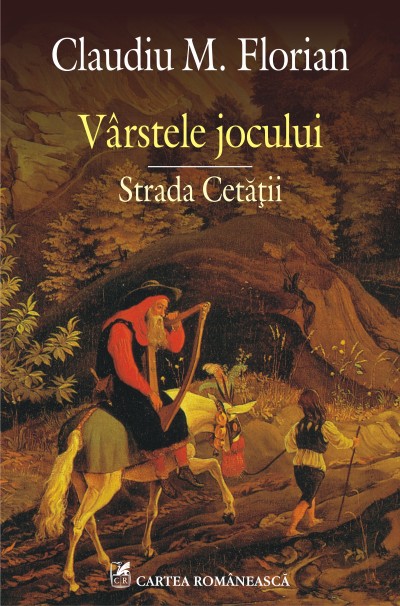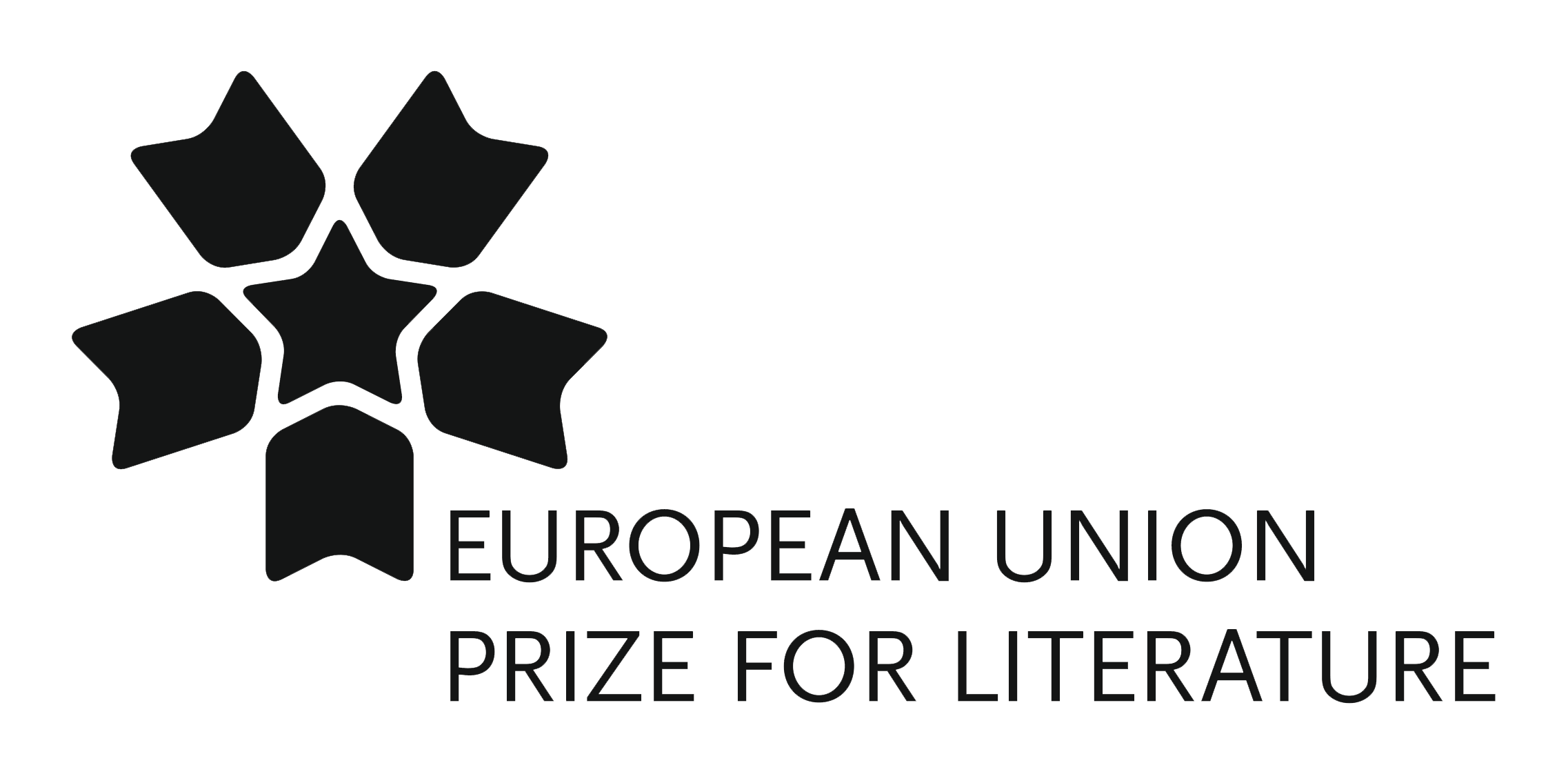

Claudiu M. Florian est né en 1969 à Rupea, dans le județ roumain de Braşov. En 1994, il a été diplômé en lettres allemandes à l’université de Bucarest, et en 1996, il a obtenu un master en étude humaniste interdisciplinaire en langue allemande. Il a ensuite continué sur sa lancée en obtenant un autre master en histoire contemporaine à l’université de Bielefeld, en Allemagne. À partir de 2002, il a travaillé comme employé au ministère des Affaires étrangères, puis, entre 2004 et 2009, il est devenu attaché culturel et de presse pour l’ambassade de Roumanie à Berlin. De 2010 à 2013, il occupait un poste haut placé à l’ambassade de Roumanie à Berne (Suisse) et aujourd’hui, depuis 2014, il travaille à l’institut culturel de Roumanie à Berlin.
Agent / Rights Director
Publishing House
Translation Deals
- Bulgaria: Колибри
- Croatia: Naklada Ljevak
- Germany: Transit
- North Macedonia: Antolog Skopje
- Hungary: Vince Publishing
- Italy: Voland Edizioni
- Serbia: Zavet
Excerpt
We are here. But we are not alone – and here is not the only place in the world. Indeed, the sky ends up in the woods behind the citadel, beyond the valley and far away, among the hills to the left and the right, but everything it covers here is itself just a part of several ways-to-be. Because there are at least another two places in the world. Or maybe three.
One is Jibert, where great-grandfather Otata lives. From the top of the citadel, only the peaks of the surrounding hills can be seen, and one gets there only by bus. People there speak Saxon all the time, a language that some cannot understand here, and they walk mostly on the earth and take the earth along, because the streets are all earthen there, paved with cobblestones only in front of the houses, while in the fields preceding the village outskirts they lean broodily over the earth and either pinch it, or knead it with their long-handled tools. A bus full of people rattles off towards the earth in Jibert every day, eases out a couple of them when it gets there, and then, after several hours, it drives back from the opposite direction to gather up and bring back some others, who every now and then are the same ones from the outgoing trip, namely Grandma and me. The bus takes us there, to the many relatives and kinsfolk living together in that village, then brings us back to Grandpa.
Then there is Dacia. The village lies between our own place and Jibert, and it can be seen from the top of the citadel, with the nib of the church belfry looking down over a handful of high-pitched rooftops showing from among the hills. There, too, some people always get off the bus, while others get on. Dacia is hardly more than a sojourn, a brief stopover on the road between the sky up here and the earth down in Jibert, with a few people always standing and waiting.
And then there is Ingermany, a place both well-known and untouchable: it lies somewhere, yet it doesn’t exist. Ingermany cannot be caught a glimpse of from anywhere, not even from the top of the citadel. However, the whole world seems to know about it. Once in a while, familiar faces show up from there. By simply coming, they give rise to gossip and liveliness, but afterwards they hastily vanish. And yet, if you chose to go there yourself, like going to Jibert to pay Otata a visit, you couldn’t. No rattling bus gets you there, to that country existing only in the stories told about it, and those all-too-seldom heard, forgotten, but always reborn old stories that make it seem like a fairy tale country. The few people who leave here every once in a while, they too go to that dreamland, and then there’s no more of them either. Some show up again from time to time, they become the same ones they used to be, for a couple of days, and start reeling off their own small stories. Then they get out of sight again, somewhere towards the end of the main street, and become the subject matter of stories told by the ones who stay behind. Ingermany seems to be a rather dismal place: all who come therefrom for a short while, as well as all who leave thereto for good burst into tears upon leaving. Some also weep upon arrival.
There seems to be another place somewhere, which also looks like it doesn't exist at all, when looked upon in this same manner: Bucharest. It’s no fairy tale realm, although it often comes up in all sorts of small stories as well. No intriguing figures come therefrom, and no one weeps upon departing thereto. No church belfry takes shape and no crowded bus stop is in sight towards its horizon. No Otata lives there – and that particular place has nothing to do under this here sky. One can easily say what Bucharest is not, but I, for one, cannot figure out what exactly it might be. There are, indeed, two faces living there, of people whose place might be here as well, who might have something in common with this here place and with us all, but who seldom make the scene. Allegedly, they are parents, genuine parents. An odd word, like a mystery bottled up and roaming the sea.
Grandma and Grandpa, they say, might not in fact be my real mother and my real father. Each has been trying patiently, for some time now, to make me understand. Father and mother, so it seems, were the two merry people who drop by from time to time and feel at home here every time they do.
They live in that Bucharest, lying, so I hear, beyond Dacia and Jibert, and impossible to see from even the top of the citadel. Because every time they show up here, it’s like they both came from Bucharest.
In the front room upstairs, above the TV, between the window facing the citadel and the green cupboard called either Kredenz, when exiled to the German language, or else kredenţu, when brought back to Romanian, there is a picture with a lot of blue in it, hanging from the wall in a slim golden frame. The blue is pale, with some deeper shades. On a battered seashore, between sky and earth, a young woman sits on a solitary piece of rock, wearing a turquoise-blue dress which looks like it is made of foam, with a cloud-coloured lace bonnet, and holding a small open umbrella on her shoulder. Her mild eyes wander dreamily across the sea, towards the horizon and the citadel. Because she turns her back to the green kredenţu, the umbrella sometimes shelters her, during daytime, from the hot sunshine flooding in. The colours of the sea, the sky, the dress, and the umbrella get intertwined. Only her complexion, the sun (the one in the picture), and the rocks are different, they are the light colour of sand. Those too get lit up by the real sun outside on certain afternoons.
When I asked Grandma who the girl in the picture might be, she heaved a deep sigh and said slowly:
“She’s your mother.”
I was puzzled: did she mean it was herself in that picture, Grandma, that is? I call her “Mother.” Why, then, did she not say, simply: “It’s me”? And yet, it is definitely not Grandma. I have seen her often looking dreamily, but never towards the sea. We have no sea here. Only the woods, the fields, the pastures on the hills, the citadel. It follows that the girl in the picture must be someone else. From somewhere far away, where there is also a sea. Someone belonging to me. A mother is likely, so they say, to belong to someone. Why not to me, then?
***
Grandma knows best how to distinguish between the different tones coming down from the Saxons’ Steeple. My own hearing takes no notice of their sequences, while Grandpa seems to be drawn to the more distant sound coming from the smaller church. On the outskirts of the village, towards the mount – as some call the rise on the horizon that is furrowed by the road, behind the houses lined up shoulder to shoulder – a second church keeps watch, whose belfry appears glued to the building, but is much smaller than the Saxons’ Steeple. It is called 'the Romanians’ Church,' and its bells' frail sound makes Grandpa startled and take notice every time they echo down the streets, across the people’s yards and through their minds. Grandpa generally answers the call of that smaller church bell – on Sundays, he always freshens up with cold water, dresses nicely, and goes out. Even if it were only, at times, to find out why the bell has tolled unexpectedly.
At the road junction leading to the upper-side street, where the promenade from under the chestnut trees begin, a similar belfry stands, church and all, behind a garden perched up on the hill crest. It is called 'the Hungarians’ Church,' because only Hungarians go to it. One of the two gate pillars has a kind of big acorn painted on it, with three crowns on top of each other, while two strange stone figures stare blankly from the tops of both. Neither Grandma nor Grandpa get startled by its bells’ occasional toll, even though both can discern that echoing sound. The Hungarians’ Church may be the closest to our home, yet the family goes, when they go, only to the Romanians’ Church, which is farther away, or to the church by the Saxons’ Steeple.
The echoes of the three belfries are not in the least easy to tell apart, their sounds being almost one-and-the-same to me; it is only the distance whence the toll is being heard that lets me know which of the three churches is pealing its bells. There are times too when all of them sound together, which, despite the turmoil they stir up in the air, also simplifies their play, from the puzzling several-ways-to-be to the soothing one-way-only.
Less confusing than the several-ways-to-be of the bells’ tolls are the several-ways-to-be of the tongues. I don’t talk to Grandpa in the same language I talk to Grandma, and he doesn’t talk to her as he talks to me. Grandpa only speaks Romanian. But we all come to learn the language of understanding through him. Grandma talks to me, when it is just the two of us, in German alone – in a different way again than to our neighbours or Saxon relatives. While Grandma’s German spoken to me feels like a flying carpet, rough, yet having straight edges and no tassels, her Saxon spoken to the rest feels like flying tassels with no carpet. Unlike hers, Grandpa’s language is also Doctor Voicu’s, and that of the manikins inside the brown-reddish TV, and of those voices in the shows especially sought for in the depths of the black radio and snatched out of there. It is also the language of O Tannenbaum in the Comrade’s version 'Oh, Handsome Fir-Tree', of Uncle Suciu and other drinking buddies. There is also a certain vicinity where they speak Hungarian.
Next door, Emerich’s grandmother is particularly skilled whenever she drops by, promptly turning to German with Grandma, to Romanian with Grandpa, and to fiddling-faddling with me. The fact that Hungarian sounds as awkward as can be – the same goes for Saxon – is no reason why people shouldn’t get on together immediately, since everyone speaking all those tongues is equally apt, as are we all whenever we find ourselves in foreign company, to jump without respite up the common tricycle of Romanian, always at hand. The languages that come together here let no one go away unenlightened. Any brief encounter in the street and any welcoming in a shared language brings up fresh knowledge as to the other person’s how-and-why. Not everybody speaks German, nor Saxon, nor Hungarian, yet they all speak Romanian. It is the tongue of the earth that lets nobody go away unknowing, irrespective of the various ways its tones roll up in the throats, on the tongues’ tips or between teeth.
Inside the brown-reddish TV, there is something to celebrate as well, tonight. No fir-tree and candles, however. There are songs, yes, but not about the fir-tree, its evergreen foliage, and Christmas; about country and party instead. And without cookies or presents. There are, in exchange, a great many images of building sites and factories, and many, many people waving their hands feverishly or clapping them for the Comrade, either standing on the pavement – while he slowly passes in front of them in a broad, black, convertible car – or else in a meeting hall as huge as a barn, where they all sit tight and look tiny, in rows after long dense rows of seats, while he stands in front of them, at the middle of a long narrow table and speaks into a pair of microphones, partially covered by a slanting sort of a cabinet, like the roof of the small lodge on top of the citadel. For a long time I have wondered how the Comrade manages to get so quickly to so many places, be it winter or summer. He seems to be everywhere.
What is being celebrated inside the TV is the end of a special year, during which, they say, our socialist homeland has taken fresh and major steps towards its independence, progress, and worldwide recognition. Then something is being said about the recent voyage of the Comrade and his Comrade-wife – whose name is just like his own, only the other name is Elena, and she’s an auntie just as small, with a swollen hairstyle – to some states said to be united and to be found in America. About understanding and friendship and about some mutual declaration they are said to have signed on that occasion. Two uncles are shown, indeed, one being the Comrade, sitting at a table and drawing something, while a few others stand behind them and watch, waiting for them to finish. Then the story turns to talks and new contacts with important organisations, to deals, to Romanian enterprises and American corporations – an opportunity for the unseen teller to speak time and again about the homeland’s interests and about the great achievements and signs of our times.
It is not for the first time that Romanian is being spoken inside the brown-reddish TV, and I still cannot grasp what is being said, as if it were an entirely foreign tongue. Equally incomprehensible words refer to the Monetary Fund and Helsinki, about a recent visit to Moscow, about cooperation between the socialist countries, and about a recently taken decision of having a nuclear plant – that is a great stronghold of energy – built in Cernavodă, somewhere along the Danube. And yet, everything shown inside the TV, the weird castles, the unusual stories, the festive music – they all look different and sound different than down here, where we live. Grandma and Grandpa only furtively glance towards it and turn it down, lower and lower.
Make no mistake, the celebration of the manikins inside the brown-reddish box of a TV has nothing to do with our celebration here, at home.
| Élément joint | Taille |
|---|---|
| EUPL_2016_RO_Claudiu_M_Florian.pdf | 260.53 Ko |
